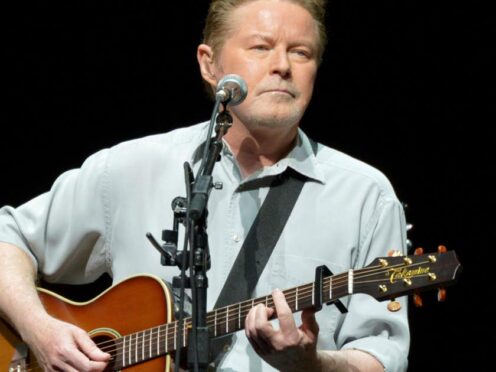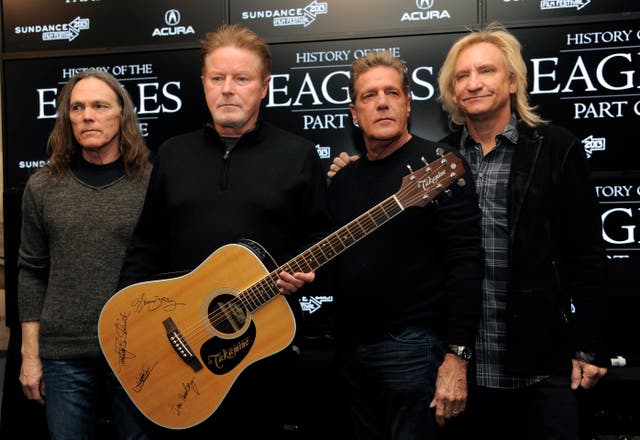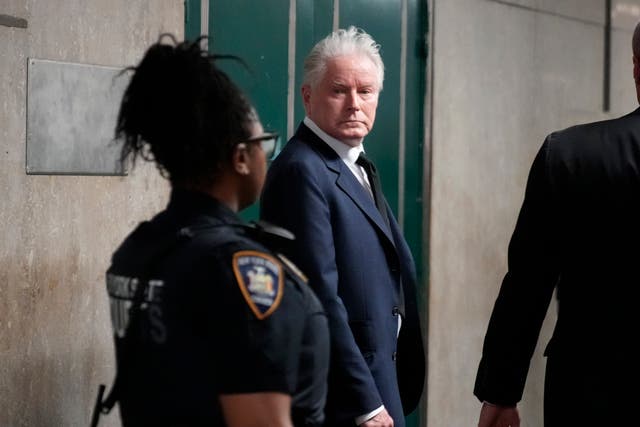
Don Henley said on Monday that he never gave away handwritten pages of draft lyrics to Hotel California and other Eagles hits.
He called them “very personal” in testimony that also delved into an ugly but unrelated episode: his 1980 arrest.
Henley, the Grammy-winning co-founder of one of the most successful bands in rock history, is the prosecutors’ star witness in an unusual criminal trial surrounding the lyrics sheets.
Henley says they were stolen decades ago from his barn in Malibu, California.

He testified on Monday that he was appalled when the material began turning up at auctions in 2012.
“It just wasn’t something that was for public viewing. It was our process. It was something very personal, very private,” he said in a raspy drawl. “I still wouldn’t show that to anybody.”
The defendants are three collectibles experts who bought the pages years later through a writer who had worked with the Eagles on a never-published band biography.
The defence maintains that Henley willingly gave them to the author.

Under cross-examination, Henley acknowledged that he did not remember “the entirety” of his conversations with the writer, Ed Sanders, who is not charged in the case.
Nor, Henley said, could he recall whether he gave Mr Sanders permission to take the documents off the property.
But Henley insisted he gave Mr Sanders only access to the documents, not permanent possession of them, in the hopes that a first-hand view of “the time and effort that went into” the lyrics would improve the book.
He said he told Mr Sanders he could look at the pages, ideally at a breakfast table in an apartment upstairs from the barn.
“I never gave him permission to keep those items,” Henley said.
At issue are about 100 sheets of legal-pad paper inscribed with lyrics-in-the-making for multiple songs on the Hotel California album, including Life In The Fast Lane, New Kid In Town and the title track that turned into one of the most durable hits in rock.
Famed for its lengthy guitar solo and puzzlingly poetic lyrics, the song still gets streamed hundreds of millions of times a year.
The defendants: rare-book dealer Glenn Horowitz and rock memorabilia specialists Craig Inciardi and Edward Kosinski; have pleaded not guilty to charges including criminally possessing stolen property.
Their lawyers say there was nothing illegal in what happened to the lyrics sheets.
The defence has signalled that it plans to question Henley, 76, about how clearly he remembers his conversations with Sanders during an era in which the rocker was living in his own fast lane.
In an apparent attempt to defuse some of those questions, a prosecutor brought up Henley’s 1980 arrest.
Henley pleaded no contest in 1981 to a misdemeanour charge of contributing to the delinquency of a minor, after authorities found cocaine, quaaludes, marijuana and a naked 16-year-old girl suffering from an overdose at his Los Angeles home the prior November.
He was sentenced to probation and a 2,500 US dollar (£1,972) fine, and he requested a drug education programme to get some possession charges dismissed.
Henley testified on Monday that he had been depressed about the Eagles 1980 breakup and had sought “an escape” by calling for a sex worker that night.
“I made a poor decision which I regret to this day,” he said.
As for his memory, he said, “I can’t tell you what I had for breakfast last Friday morning, but I can tell you where we stayed when we played Wembley (Stadium) in 1975 and we opened for Elton John and the Beach Boys.”
Mr Sanders began working with the Eagles in 1979 on a band biography that never made it into print. He sold the documents to Horowitz, who sold them to Kosinski and Inciardi.
Kosinski has a rock ‘n’ roll collectibles auction site; Inciardi was then a curator at the Rock and Roll Hall of Fame.
Henley reported them stolen after Inciardi and Kosinski began in 2012 to offer them at various auctions.
Henley also bought four pages back for 8,500 dollars (£6,705) in 2012.
He testified that he resented having to buy back what he contends was his own property.
But he said he saw it as “the most practical and expedient” way to get the auction listing, which contained photos of the lyrics sheets, off the internet.
Kosinski’s lawyers, however, have argued that the transaction implicitly recognised his ownership.

Enjoy the convenience of having The Sunday Post delivered as a digital ePaper straight to your smartphone, tablet or computer.
Subscribe for only £5.49 a month and enjoy all the benefits of the printed paper as a digital replica.
Subscribe